By Eric Vandenbroeck and co-workers
Iran Putting Up a Brave Face
Following the chaos that broke in Syria Iran
has sought to put a brave face on the sudden overthrow of its Syrian ally
Bashar al-Assad, insisting it will continue to confront the US and Israel in
the region even after evacuating thousands of its citizens during the rebel
takeover of Damascus.
Ayatollah Ali
Khamenei, Iran’s supreme leader, said on Wednesday in his first comments since
the defeat of the regime in Syria that Iran’s “resistance front” of allies
across the Middle East would “grow stronger under pressure” and “extend its
reach over the entire region.”
But Tehran has also
acknowledged evacuating its citizens from Syria in the face of the Islamist
rebel advance. “Over 4,000 Iranian citizens have been flown back home from
Syria aboard 10 Mahan Air flights in the past three days,” said government
spokesperson Fatemeh Mohajerani, adding that the foreign ministry would ensure
the evacuation of every last Iranian citizen.
It is unclear if the
evacuees include Iranian pilgrims, diplomats or military personnel stationed in
Syria. Esmaeil Baghaei of the foreign ministry said
earlier that Iranian diplomats had all been safely
withdrawn from Iran’s embassy in Damascus before the building was attacked.
Khamenei noted that
Iranian forces were on an “advisory” mission in Syria and could not fight
instead of the Syrian army, whose feebleness he blamed for the speedy downfall
of the regime. “The troubles Syria is experiencing today is the result of its
army showing weakness and losing its steadfastness and resilience.”
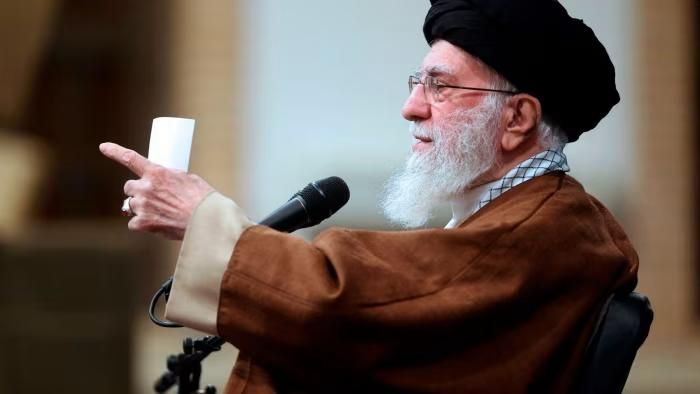
Analysts see Assad’s
fall as a severe blow for the regional influence that Iran has nurtured over
the past four decades through proxies and supporters eager to confront both
Israel and the US. Syria was used by Iran as a supply route to aid and fund Hizbollah in Lebanon, Shia militias in Iraq and the Houthis
in Yemen.
Iran’s military
forces and facilities, stationed in Syria for many years, were often targeted
by Israeli air strikes during the past year. Israel has also assassinated Hizbollah leaders and targeted the group’s weapons stocks
and infrastructure ahead of a ceasefire agreed last month.
Russia, the other
crucial international supporter of the Assad regime, has also been shocked by
his defeat and has granted asylum to the deposed leader. For years Moscow was
Assad’s main military supporter, attacking rebels with its warplanes until days
before their final victory. The Kremlin has now withdrawn its forces from parts
of Syria but has so far maintained its main air and naval bases on the
Mediterranean.
On Wednesday, Iran
rejected reports that $42mn of cash had been stolen from its embassy in
Damascus after video footage emerged of assailants looting the building on
Sunday. It said all contingency plans had been taken before evacuation.
Outside the ransacked Iranian embassy in Damascus on
December 9, 2024.
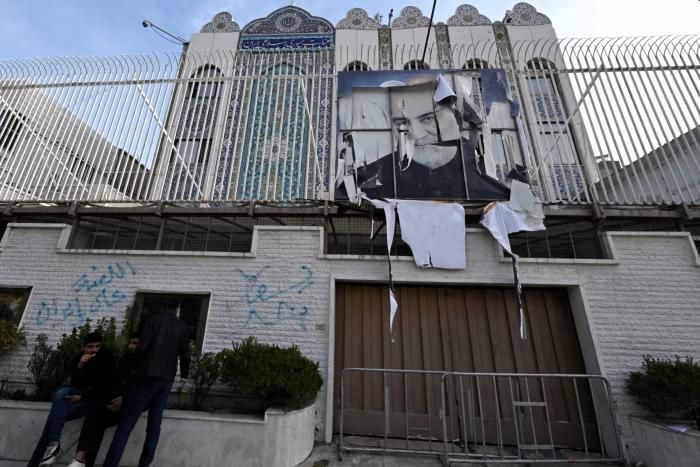
Khamenei warned
against suggestions that Iran itself would be weakened by events in Syria and
Lebanon. “Iran is powerful and will grow more powerful,” he said, warning that
“using commentaries or analyses to dishearten the people is an offence”.
Tehran is cautiously
examining how to deal with Syria’s new rulers, and two former Iranian lawmakers
have raised concerns about Syria’s debts to Iran, which they said amounted to
billions of dollars.
Khamenei, however,
seems to be hoping the situation will eventually turn in favor of Tehran.
“Some celebrating in
Damascus and seizing people’s houses, or the Zionist regime bombing targets in Syria . . . this will not last long,” he said. “The Syrian
youth will rise up and turn around the situation.” He did
nevertheless admit that this could take a long time.
Assad fall
furthermore is huge blow to Putin, highlighting the fragility of his own
rule
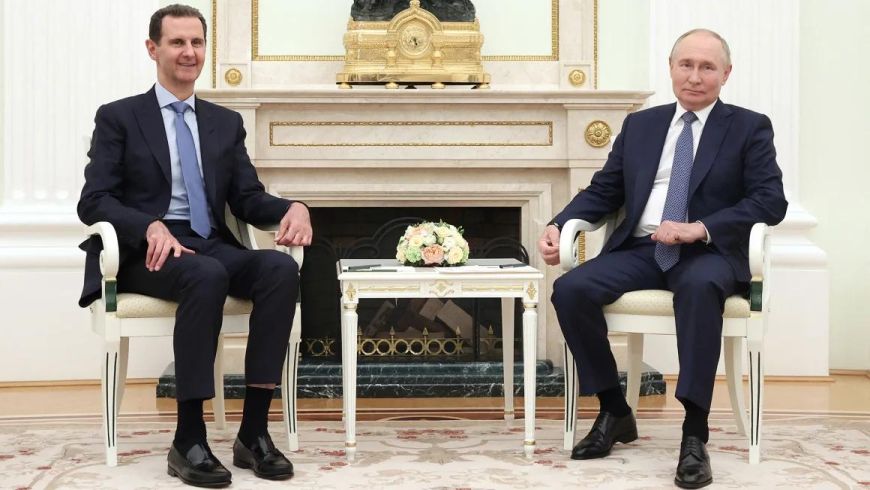
Assad’s flight to Moscow following the swift collapse of his
regime means more than just the loss of a client state for the Kremlin.
The fall of the House
of Assad deals a major blow to Russian President Vladimir Putin’s aspirations
as a Middle East power broker and raises new questions about the fragility of
his regime.
For observers of
Russia’s war on Ukraine, Assad’s departure raises some striking historical
parallels.
Assad now joins a
onetime Ukrainian counterpart in exile: Former Ukrainian President Viktor Yanukovych fled Ukraine for Russia in 2014
after weeks of street protests that culminated in a bloody crackdown.
And unlike Assad,
whose forces appeared to surrender Damascus without a fight, Ukrainian
President Volodymyr Zelensky held fast as Russian troops approached Kyiv.
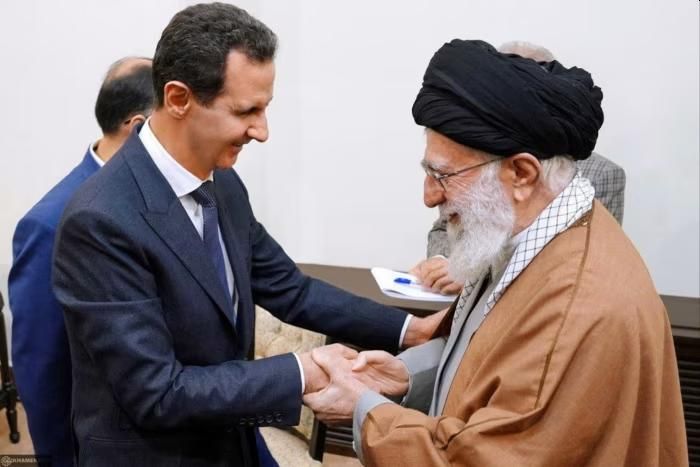
Whereby Iran's
Supreme Leader Ayatollah Ali Khamenei has blamed the fall of the Assad
regime on the US and Israel.
In his first address
since the toppling of Syrian President Bashar al-Assad, Ayatollah Ali Khamenei
excoriated the United States and Israel.
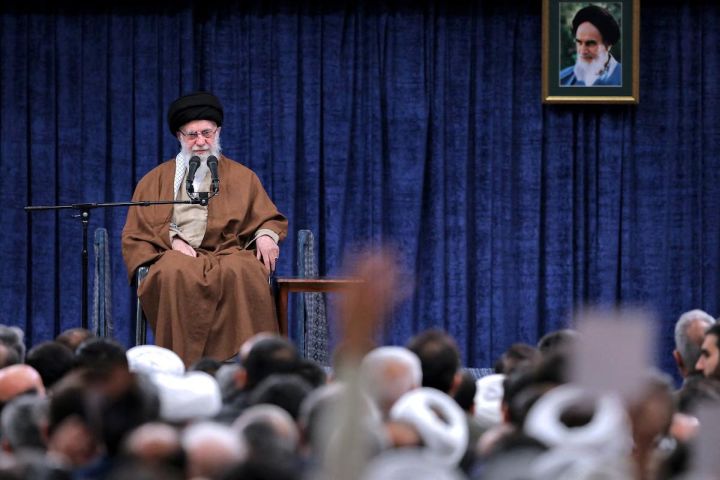
“The main plotter, the
main planner, the main agent, the main command room is in the United States and
the Zionist regime,” Ayatollah Ali Khamenei said Wednesday to a crowd of
hundreds packed into a Tehran hall to hear his
address.
For updates click hompage here